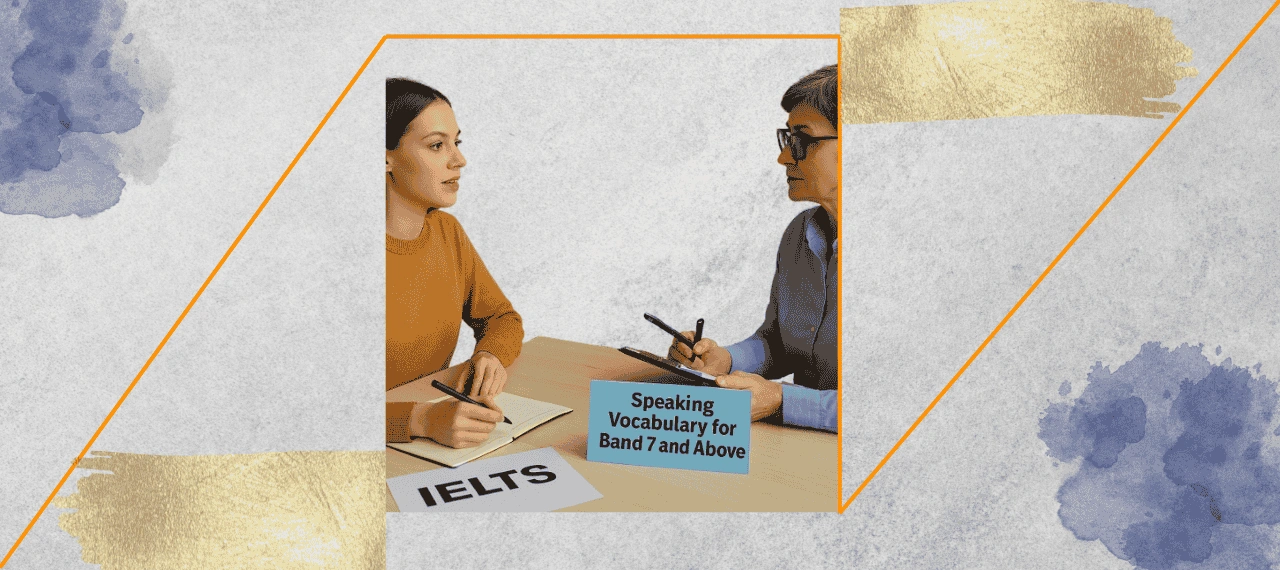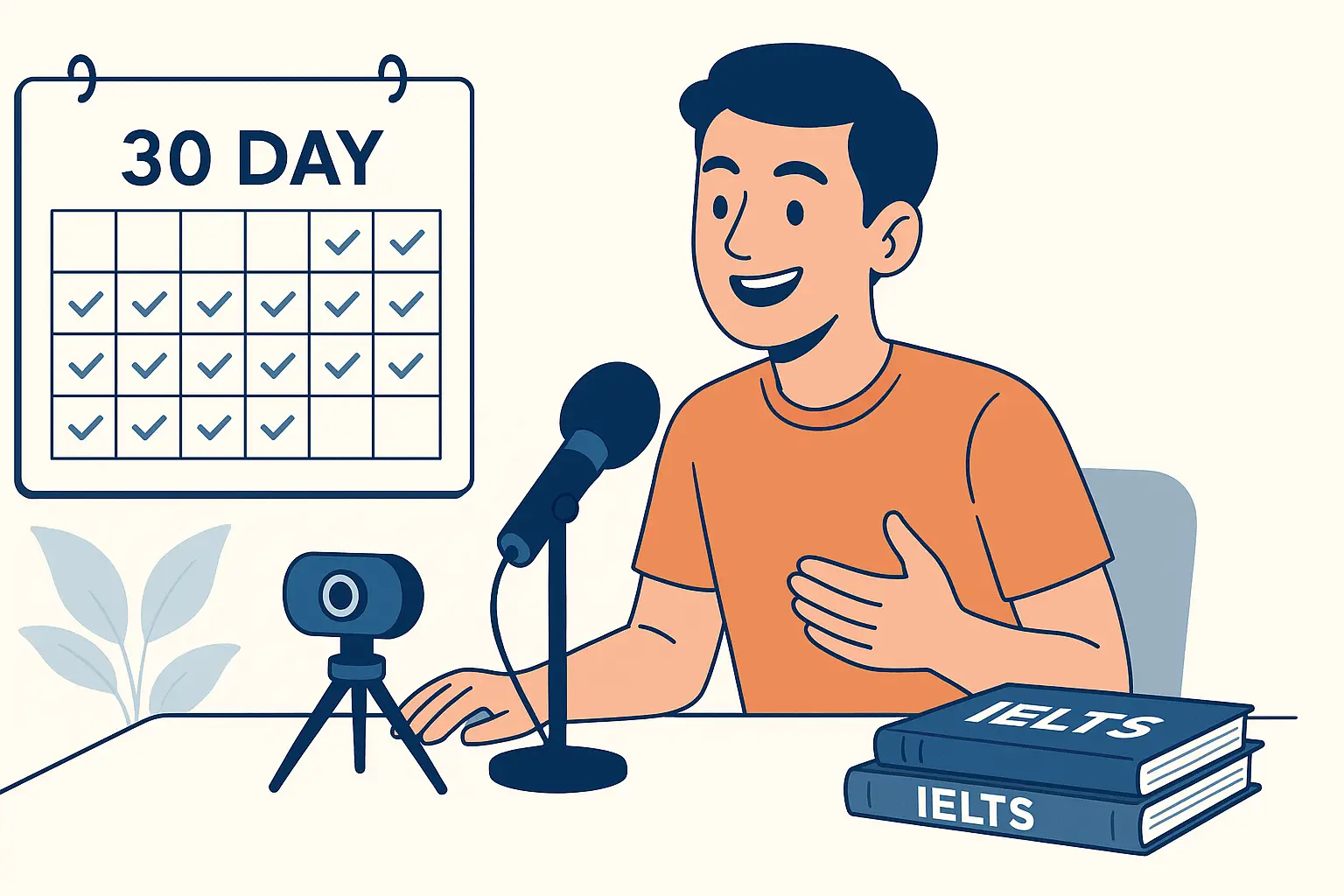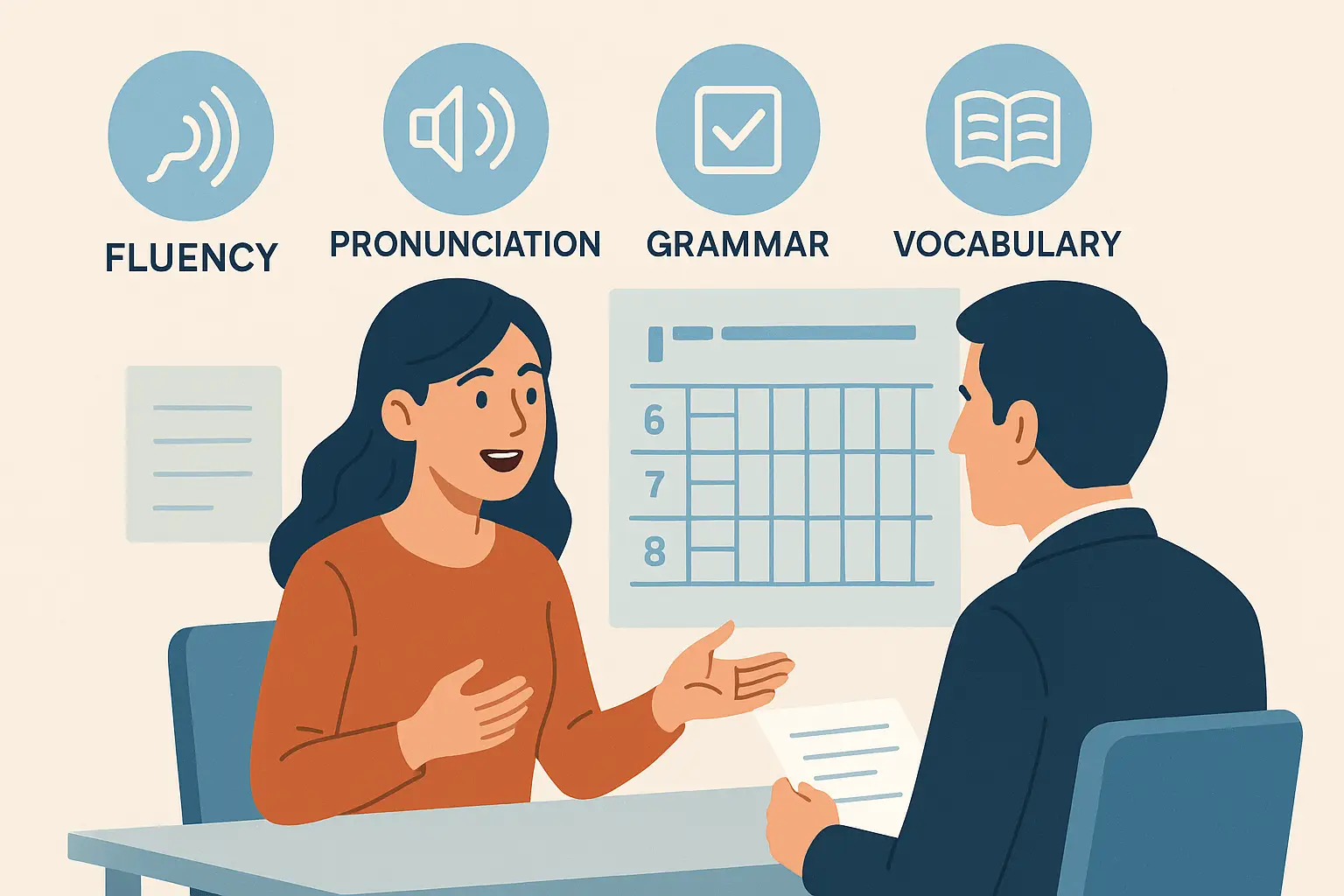- What We Will Cover
- 🔍 What Does “Band 7 Vocabulary” Really Mean?
- 🌍 Environment Vocabulary for IELTS Speaking
- 💼 Work & Study Vocabulary for IELTS Speaking
- 🏃♂️ Health & Fitness Vocabulary for IELTS Speaking
- 💻 Technology Vocabulary for IELTS Speaking
- ✈️ Travel & Tourism Vocabulary for IELTS Speaking
- 🏛️ Society & Culture Vocabulary for IELTS Speaking
- 🎯 Practice Task: Use & Record
- 💬 Final Takeaway: Speak with Confidence, Not Complexity
“Sir, do I really need fancy words to get Band 7?”
That’s a question I hear all the time — especially from students who feel like they’ve done everything right. One of them, Rafi from Dhaka, had just finished his third IELTS Speaking test. His fluency was solid, his grammar was clean, and he sounded natural — yet he still got a 6.5.
He messaged me saying, “Sir, I don’t get it. I didn’t make any mistakes. Do I need to use more ‘big’ words?”
Here’s what I told him: Band 7 vocabulary isn’t about using fancy or rare words. It’s about using the right words — clearly, naturally, and appropriately for the topic. Examiners aren’t impressed by complexity for its own sake. They’re listening for vocabulary that is flexible, accurate, and expressive — the kind you’d hear in a real-life conversation or discussion.
So in this guide, I’ll walk you through exactly what examiners want to hear. You’ll get topic-specific word sets, real examples from my own students, common mistakes to avoid, and the kind of vocabulary that quietly — but powerfully — says, “I’m Band 7+.”
What We Will Cover
Here’s exactly what you’ll get from this post — designed to boost both your vocabulary and your confidence:
- ✅ A clear breakdown of how Band 6 vocabulary differs from Band 7 and above
- ✅ Topic-based vocabulary sets for common IELTS Speaking themes
- ✅ Real student mistakes (and how to improve them)
- ✅ Tips to sound more natural — not memorised or robotic
- ✅ A short, practical task you can start using today
👉 Also read: IELTS Speaking Band Descriptors Explained
🔍 What Does “Band 7 Vocabulary” Really Mean?
Let’s clear up a huge misconception: scoring Band 7 doesn’t require you to use high-level academic words or sound like an English professor. What it actually requires is control — the ability to express ideas with variety, clarity, and flexibility.
When we talk about IELTS Speaking Vocabulary for Band 7 and Above, we’re talking about:
- Choosing topic-appropriate words with confidence
- Avoiding repetitive or overly simple terms like “good,” “nice,” or “bad”
- Paraphrasing naturally when you forget a word — without freezing
- Using topic-specific words where relevant (e.g., “carbon footprint” in environment questions, or “job satisfaction” in work topics)
Here’s how examiners interpret it:
- Band 6: “adequate range of vocabulary,” but with repetition or odd word choices
- Band 7: “flexible use of vocabulary,” showing control, tone, and meaning
Band 6 vs Band 7 Example
- Band 6: “I think technology is good. It helps people.”
- Band 7: “I believe technology is incredibly helpful — especially when it comes to communication and online learning.”
That second version isn’t complicated — but it’s specific, well-phrased, and confident. That’s the kind of vocabulary that earns Band 7 and above.
🌍 Environment Vocabulary for IELTS Speaking
Why This Topic Matters
Questions about the environment are a favourite in IELTS Speaking, especially in Part 3. Whether it’s climate change, sustainability, or pollution, this topic gives you a great opportunity to show your ability to speak naturally and specifically using higher-level vocabulary — not just memorised phrases.
Band 7+ Vocabulary Phrases
- Climate crisis: “Many governments are trying to tackle the ongoing climate crisis.”
- Renewable energy: “Switching to renewable energy is essential for reducing our carbon footprint.”
- Carbon emissions: “I believe carpooling is one way to lower carbon emissions in cities.”
- Sustainable lifestyle: “A lot of young people are adopting a more sustainable lifestyle — like using reusable bags or eating less meat.”
- Deforestation: “Deforestation is a serious issue, especially in rainforest areas like the Amazon.”
Student Mistake to Avoid
❌ “Pollution is bad. People should stop it.”
✅ “Pollution is definitely a problem, but governments can reduce its impact through education and green policies.”
Natural Phrase Add-Ons
- “One issue that worries me most is…”
- “Personally, I try to be eco-friendly by…”
- “It’s not just about individuals — policy plays a huge role.”
👉 Also read: Grammar for IELTS Speaking
💼 Work & Study Vocabulary for IELTS Speaking
Why This Topic Matters
Work and study are core topics in IELTS Speaking — especially in Part 1. You might be asked what you do, why you chose your field, or what your future plans are. These questions sound simple, but they’re also a great opportunity to show fluency, structure, and vocabulary control.
Band 7+ Vocabulary Phrases
- Workload: “My workload this term has been quite heavy, especially with group assignments and presentations.”
- Time management: “I try to manage my time well by setting daily priorities and sticking to a routine.”
- Team collaboration: “Working in teams has helped me develop my communication and collaboration skills.”
- Job satisfaction: “For me, job satisfaction is more important than a high salary.”
- Career prospects: “I chose this degree because it offers good career prospects in both tech and education sectors.”
Student Mistake to Avoid
❌ “I study computer. It is good. I want job.”
✅ “I’m currently studying computer science because I’ve always been interested in how systems work. I hope to get a job in software development after graduation.”
Natural Phrase Add-Ons
- “What I enjoy most about my work/study is…”
- “One challenge I face is…”
- “In the future, I’d love to work in…”
🏃♂️ Health & Fitness Vocabulary for IELTS Speaking
Why This Topic Matters
Questions about personal health, fitness habits, or healthcare systems often appear in both Part 1 and Part 3. Your ability to talk naturally about healthy lifestyles, exercise, or wellbeing gives you a great chance to show off topic-specific vocabulary.
Band 7+ Vocabulary Phrases
- Balanced diet: “I try to eat a balanced diet, including fruits, vegetables, and lean protein.”
- Sedentary lifestyle: “Many office workers suffer from health issues due to a sedentary lifestyle.”
- Mental wellbeing: “Exercise plays a huge role in maintaining my mental wellbeing.”
- Preventive care: “Preventive care is more affordable and effective than treating chronic illnesses later.”
- Cardio workout: “I usually go for a cardio workout three times a week, like jogging or cycling.”
Student Mistake to Avoid
❌ “I do exercise. It is healthy.” ✅ “I usually go to the gym twice a week for strength training and take long walks on weekends. It helps me stay both fit and relaxed.”
Natural Phrase Add-Ons
- “To stay in shape, I usually…”
- “When I feel stressed, I find that…”
- “A healthy lifestyle, in my opinion, isn’t just about food — it’s also about mindset.”
💻 Technology Vocabulary for IELTS Speaking
Why This Topic Matters
Technology is one of the most common and flexible IELTS topics — it can appear in Part 1 (daily use), Part 2 (a useful gadget), or Part 3 (impact on society). You’ll need vocabulary that covers both personal habits and big-picture thinking.
Band 7+ Vocabulary Phrases
- Digital detox: “Every weekend, I try to do a digital detox to reduce screen time.”
- User-friendly interface: “I prefer apps with a clean, user-friendly interface that don’t waste time.”
- Artificial intelligence: “Artificial intelligence is reshaping industries, especially in healthcare and education.”
- Online privacy: “Online privacy is becoming a huge concern with the rise of social media platforms.”
- Cutting-edge technology: “Start-ups are usually the ones experimenting with cutting-edge technology.”
Student Mistake to Avoid
❌ “I like technology. It is helpful.” ✅ “I rely on technology every day — from using productivity apps to attending online classes. It saves time and helps me stay organised.”
Natural Phrase Add-Ons
- “To be honest, I depend on my phone for almost everything…”
- “Technology has made life more convenient, but also more distracting.”
- “I think the biggest innovation recently has been…”
✈️ Travel & Tourism Vocabulary for IELTS Speaking
Why This Topic Matters
Whether you’re asked about places you’ve visited, travel preferences, or the effects of tourism, this topic appears frequently across all three parts of the speaking test. Examiners want to hear if you can use descriptive and topic-appropriate vocabulary with ease.
Band 7+ Vocabulary Phrases
- Cultural experience: “Travelling abroad gives me a chance to enjoy new cuisines and unique cultural experiences.”
- Off the beaten path: “I prefer visiting places that are off the beaten path — less crowded and more authentic.”
- Tourist attractions: “London has so many famous tourist attractions like the Tower of London and Buckingham Palace.”
- Local cuisine: “Trying local cuisine is one of my favourite parts of travelling — I love exploring traditional dishes.”
- Travel itinerary: “When I travel, I like to plan a flexible travel itinerary so I can balance sightseeing with rest.”
Student Mistake to Avoid
❌ “I went to place. It was fun. I like travel.” ✅ “Last year, I travelled to Nepal. The landscape was breathtaking, and I particularly enjoyed hiking through quiet mountain trails far from tourist crowds.”
Natural Phrase Add-Ons
- “One of the most memorable trips I’ve taken was to…”
- “If I had more time and money, I’d love to visit…”
- “I think travel is important because it opens your mind to different ways of life.”
🏛️ Society & Culture Vocabulary for IELTS Speaking
Why This Topic Matters
This is one of the broadest and most challenging areas in the IELTS Speaking test — especially in Part 3. You may be asked about traditions, gender roles, social issues, or changes in modern culture. Having the right vocabulary helps you sound thoughtful and mature.
Band 7+ Vocabulary Phrases
- Cultural norms: “Cultural norms vary widely from one country to another, especially regarding dress codes or communication styles.”
- Gender equality: “In recent years, there’s been more awareness and advocacy for gender equality, particularly in education and the workplace.”
- Social mobility: “Education plays a key role in promoting social mobility and reducing income inequality.”
- Traditional values: “In some cultures, traditional values like respect for elders are still deeply ingrained.”
- Generational gap: “There’s often a generational gap when it comes to attitudes toward technology or career choices.”
Student Mistake to Avoid
❌ “Old people and young people think different. Society change fast.” ✅ “There’s definitely a generational divide in my country — especially around topics like marriage, career, and even the use of social media.”
Natural Phrase Add-Ons
- “In my culture, it’s quite common to…”
- “This is a topic that often sparks debate, especially among…”
- “Social change doesn’t happen overnight, but I think we’re heading in the right direction.”
🎯 Practice Task: Use & Record
Choose any one of the topics above. Then:
- Pick 3–5 vocabulary phrases from that section.
- Record a 60–90 second response to a related IELTS Speaking question.
- Replay your answer and ask:
- Did I use the words naturally, not force them in?
- Did I sound confident and fluent?
- Could an examiner clearly hear variety in my vocabulary?
🎧 Bonus tip: Share your answer with a study partner or tutor. Fresh ears can often catch awkward phrasing that you’ve missed.
👉 Want more prompts? Visit: IELTS Speaking Practice Tests
💬 Final Takeaway: Speak with Confidence, Not Complexity
Vocabulary doesn’t have to be impressive — it has to be appropriate.
The students who score Band 7 and above aren’t using rare or academic words. They’re using topic-relevant, descriptive, and flexible language that shows they can speak about real ideas.
So instead of memorising long lists of words, focus on:
- Practising vocabulary by theme
- Speaking in full, connected sentences
- Listening back to improve tone and natural flow
📌 Bookmark this guide and return to it regularly as you prep. Let these phrases become part of your real speaking voice.
👉 Also explore: IELTS Speaking Band Descriptors Explained
👉 Next step: IELTS Speaking Practice Tests
🙌 You’ve got this — now go speak like the Band 7+ student you are becoming!






4 Responses
It is in reality a nice and useful piece of information. I?¦m satisfied that you just shared this helpful info with us. Please keep us up to date like this. Thank you for sharing.
It?¦s really a nice and useful piece of info. I?¦m satisfied that you shared this helpful info with us. Please keep us up to date like this. Thank you for sharing.
Thank you for the auspicious writeup. It in truth used to be a entertainment account it. Look complicated to more delivered agreeable from you! By the way, how can we keep in touch?
WONDERFUL Post.thanks for share..more wait .. …